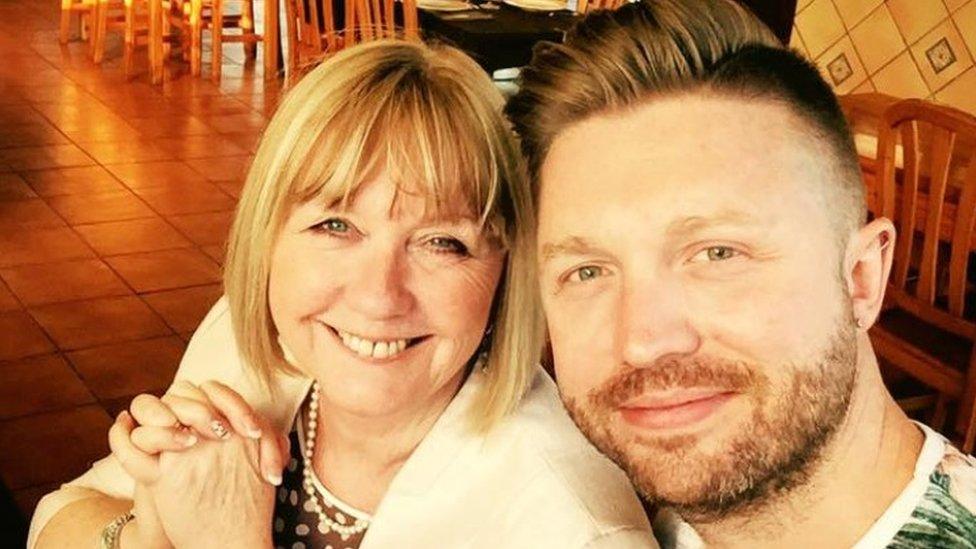Alice, Darling: The film putting coercive control in the spotlight
- Published
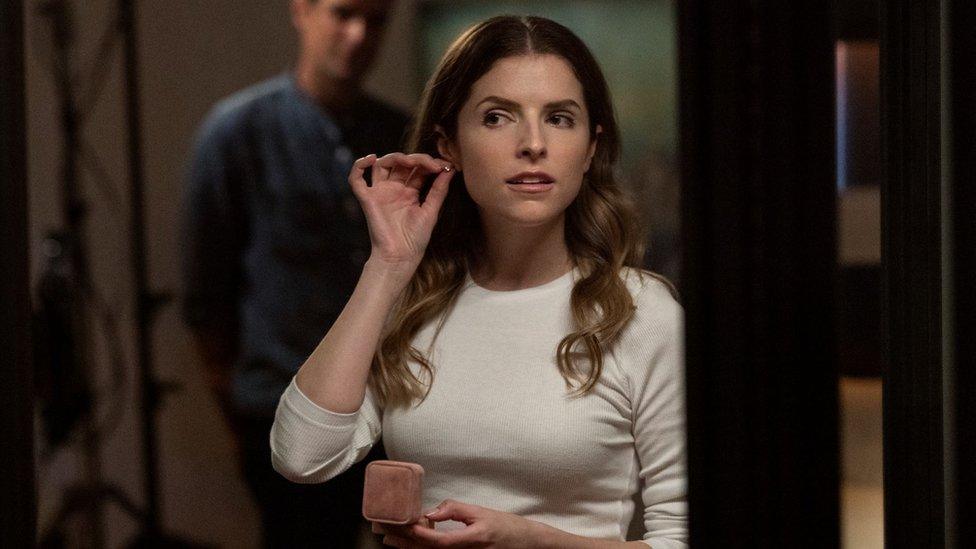
Anna Kendrick plays a victim of coercive control in Alice, Darling
If Mary Nighy has any doubts about the resonance of her first feature film Alice, Darling, she just needs to look at her social media accounts.
The actor and filmmaker has been inundated with direct messages on Instagram from people who have seen the film and want to share their stories.
According to Nighy, it was ever thus: "Even during the editing, sharing early versions of the film, just seeing how emotional people became. That's actually quite a lot to carry. There's a big responsibility."
In Alice, Darling, Anna Kendrick plays a 30-year-old successful woman trapped in a coercive relationship with Simon, played by British actor Charlie Carrick.
Kendrick has been praised for her portrayal of Alice, a role far removed from those she is best known for in comedies such as Up In the Air or musicals like Pitch Perfect.
Nighy says: "What I didn't know, when I offered her the part, was that it was relevant to her own life."
Kendrick has spoken about her own experiences of being in an emotionally abusive relationship, external during promotion for the film. It was this personal insight which made her the "exact right person" for Alice, the film's screenwriter, Alanna Francis, explains.
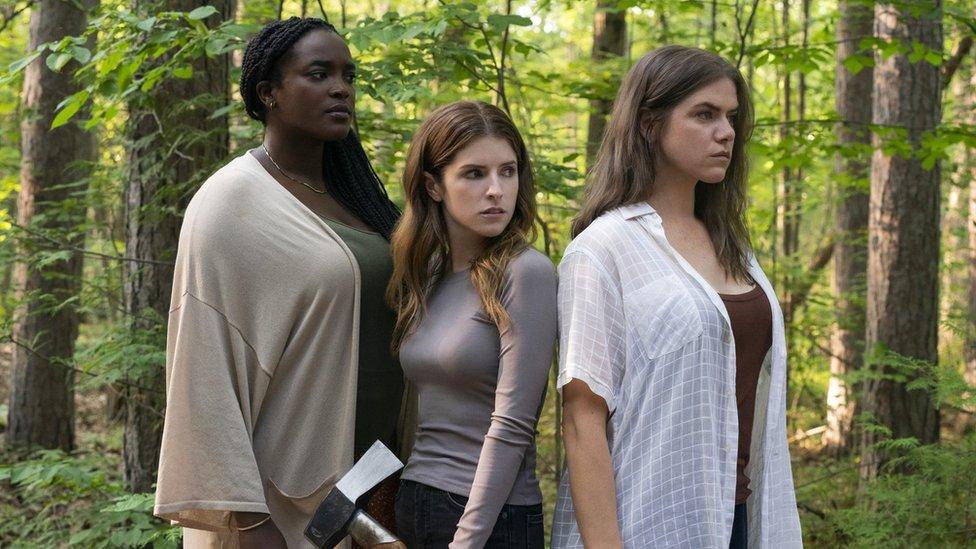
Alice's friends try to intervene
"It was a really productive outlet for me to have to speak to her, and bring some of her experiences," she says, having herself been inspired to write the script by her own experience in a former relationship.
Like TV series such as Sharon Horgan's Bad Sisters and Channel 4's I Am Nicola, the film examines a relationship which is emotionally, rather than physically abusive.
The domestic abuse charity Refuge describes this kind of abuse as coercive control, "where a perpetrator uses a pattern of behaviour over time to exert power and control over a partner".
Coercive control was made illegal in England and Wales in 2015.
However, in an early draft of the film, Francis was tempted to include a scene which showed evidence of Alice being physically abused.
"If I'm being really honest, that draft was probably influenced by fear that people wouldn't understand. When we talked about it, the team around me said: 'No, we can do the subtle version', and everyone was really dedicated to that."
Nighy adds: "Because it's such a recently diagnosed and understood and spoken about form of abuse, I think there was an anxiety about whether or not it could carry the film. And I think absolutely it can."
One key line in the film occurs when Alice's best friends stage an intervention of sorts, taking her away on a mini-break.
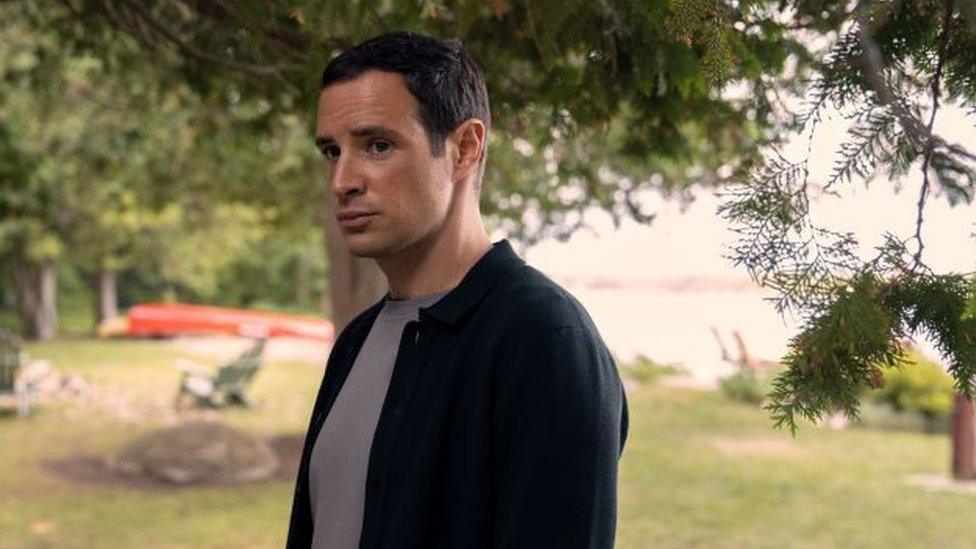
Carrick plays sinister boyfriend Simon
"But he doesn't hurt me," Alice says, as she struggles to come to terms with the truth about her relationship.
The Crime Survey for England and Wales (CSEW) estimated that 5.0% of adults (6.9% women and 3.0% men) aged 16 years and over experienced domestic abuse in the year ending March 2022; this equates to an estimated 2.4 million adults (1.7 million women and 699,000 men).
A spokesperson for the charity Women's Aid says: "Women in abusive relationships aren't always aware that their relationship is unhealthy, and abusive partners often isolate a woman from her friends and support network, where conversations about relationships can often identify when things aren't quite right."
"Storylines like this can reach audiences in a way that we can't and although this is fictional, a lot of the behaviours that we see on screen will reflect those that women experience every day."
The film has received largely positive to middling reviews. Empire's Helen O'Hara, external gave it four stars: "This is a slow-burning drama, almost a thriller, anchored by a faultless performance from Kendrick and punctuated by a quietly monstrous turn from Carrick, as a man who thinks he's entirely reasonable. But it's ultimately the warmth of Mosaku and Horn that lingers in the mind, as the women who wake Alice up and stand with her against the omnipresent spectre of male violence."
The Guardian's Peter Bradshaw, external gave it three stars: "There are some edge-of-the-seat moments and interestingly subtle tonal inflexions, though the story spends time on a contrived subplot about a missing girl, time that might have been better devoted to developing the central thriller storyline."
The movie was shot in 20 days in Toronto and rural Canada, during the pandemic.
According to Nighy, it was the perfect atmosphere for filming.
Power dynamics
"The fact of being in a very rural place: there were no paparazzi. So that was intimate. And I think it helped the trust between all the actors and myself and the heads of department as well."
And Kendrick praised the director for creating a safe environment on se, externalt, in an interview with Tom Power for his Q podcast.
"There were days where camera rehearsals would end up devolving into group therapy. It was probably the only time I would see the lovely English rose Mary say: 'Guys we are here to shoot a movie.'"
While the film garnered a 43% rating with film fans on Rotten Tomatoes, external (albeit with fewer than 50 verified ratings), Nighy feels audience reaction to the film since it premiered at the Toronto Film Festival last year is proof that the story has struck a chord.
"What surprised me is that a lot of men have come forward. I think there's an assumption that it's always women," she says.
"It's worthwhile everybody questioning the power dynamics that they employ in their relationships - outside of it being a straight, heterosexual, male-female thing.
"The film's meant to unnerve people a little bit. And pose questions."
Alice, Darling is available in the UK on various streaming platforms.
If you've been affected by domestic abuse or controlling behaviour, help and support is available via the BBC Action Line.
Related topics
- Published11 May 2015
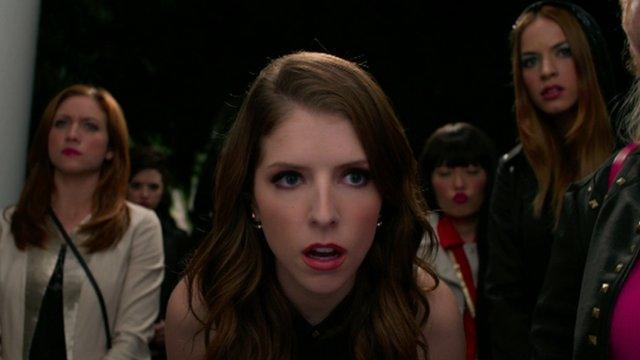
- Published27 September 2022
